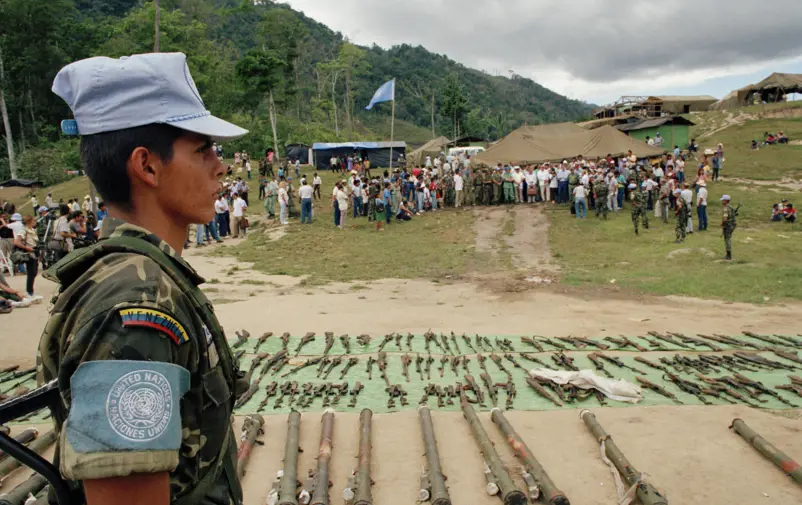Disarmament, Demobilization, Reintegration of Ex-Combatants and Security Transitions
The signing of a peace agreement in a country affected by violent conflict marks the beginning of a sensitive transitional period from war to peace. This commonly entails the dismantling of armed groups, the collection and destruction of illegal weapons, and projects aimed at helping former combatants reintegrate into civilian life, for example through support to find housing and employment or reuniting with missing family members, but also in some instances achieve reconciliation at a community level and support to victims.Programs for disarmament, demobilization and reintegration (DDR) of ex-combatants form an important part of efforts to rebuild war-torn societies and creates conditions for sustainable peace.
Peace treaties often include an agreement on the creation and design of a DDR program. An external, international actor, such as the UN commonly is tasked with implementing or overseeing such a program.
Effective and successful DDR processes reduce the peril of ex-combatants taking up arms again and thus mitigate the risk of renewed armed conflict.
Programs and activities that explicitly consider different needs and capacities for its participants better attain expected results. In order to achieve sustainable reintegration of former combatants and others affiliated with armed groups, DDR activities should involve victims of the conflict and other civilians in the local community.
The possibilities to achieve comprehensive peace agreements have diminished substantially lately. This is a result of proliferation of armed groups, a difficult security situation in general and many armed groups designated as terrorist organizations by FN and others.
To meet this emerging situation, the UN has updated and developed its approach to DDR, to still be able to contribute to violence reduction and initiation of political dialogue and increased trust between parties.
For instance, DDR activities and programmes can be initiated in situations where there is still an ongoing conflict to prevent especially young people from being recruited by armed actors and increase control of weapons.
What does the FBA do?
- Training and advice
FBA offers training and advice on DDR. For example, FBA has given advice on DDR to the parties of the peace process in Colombia. FBA also played an important role in the creation of the UN guidelines for DDR in 2006, and supports the UN’s continuous work to update the guidelines. - Research
FBA conducts and supports international research on DDR. - Secondments
FBA seconds personnel working within the field of DDR to international peace operations that Sweden contributes to, led by the EU, UN and OSCE. Click here to see a map of where our personnel is currently deployed. - Our partner countries
Within the framework of Sweden’s international development aid, FBA carries out projects concerning DDR. Click here to read more about the countries where we work.







 >
> >
>

